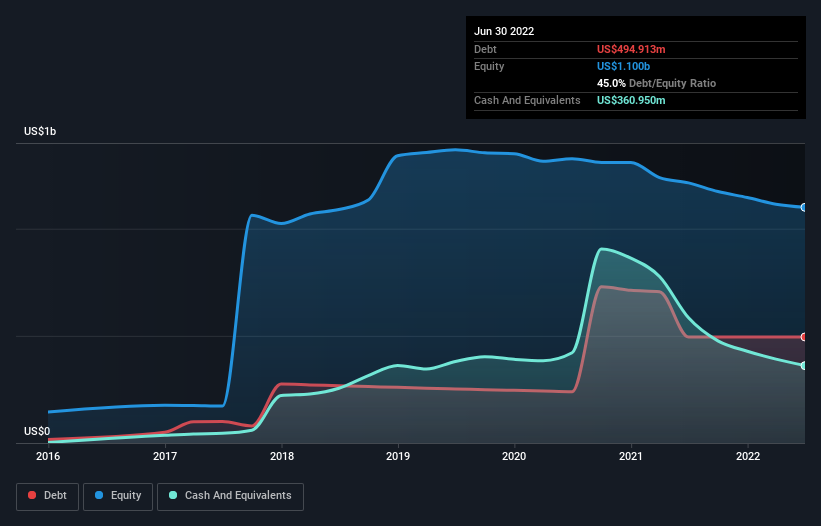- United States
- /
- Interactive Media and Services
- /
- NasdaqGS:ANGI
We Think Angi (NASDAQ:ANGI) Has A Fair Chunk Of Debt

Warren Buffett famously said, 'Volatility is far from synonymous with risk.' So it seems the smart money knows that debt - which is usually involved in bankruptcies - is a very important factor, when you assess how risky a company is. Importantly, Angi Inc. (NASDAQ:ANGI) does carry debt. But should shareholders be worried about its use of debt?
Why Does Debt Bring Risk?
Debt is a tool to help businesses grow, but if a business is incapable of paying off its lenders, then it exists at their mercy. Part and parcel of capitalism is the process of 'creative destruction' where failed businesses are mercilessly liquidated by their bankers. However, a more usual (but still expensive) situation is where a company must dilute shareholders at a cheap share price simply to get debt under control. By replacing dilution, though, debt can be an extremely good tool for businesses that need capital to invest in growth at high rates of return. When we think about a company's use of debt, we first look at cash and debt together.
Check out our latest analysis for Angi
How Much Debt Does Angi Carry?
As you can see below, Angi had US$494.9m of debt, at June 2022, which is about the same as the year before. You can click the chart for greater detail. On the flip side, it has US$361.0m in cash leading to net debt of about US$134.0m.

How Strong Is Angi's Balance Sheet?
Zooming in on the latest balance sheet data, we can see that Angi had liabilities of US$337.6m due within 12 months and liabilities of US$580.0m due beyond that. Offsetting these obligations, it had cash of US$361.0m as well as receivables valued at US$119.8m due within 12 months. So its liabilities total US$436.9m more than the combination of its cash and short-term receivables.
While this might seem like a lot, it is not so bad since Angi has a market capitalization of US$1.06b, and so it could probably strengthen its balance sheet by raising capital if it needed to. However, it is still worthwhile taking a close look at its ability to pay off debt. When analysing debt levels, the balance sheet is the obvious place to start. But ultimately the future profitability of the business will decide if Angi can strengthen its balance sheet over time. So if you're focused on the future you can check out this free report showing analyst profit forecasts.
In the last year Angi wasn't profitable at an EBIT level, but managed to grow its revenue by 17%, to US$1.8b. That rate of growth is a bit slow for our taste, but it takes all types to make a world.
Caveat Emptor
Over the last twelve months Angi produced an earnings before interest and tax (EBIT) loss. Its EBIT loss was a whopping US$114m. When we look at that and recall the liabilities on its balance sheet, relative to cash, it seems unwise to us for the company to have any debt. So we think its balance sheet is a little strained, though not beyond repair. Another cause for caution is that is bled US$143m in negative free cash flow over the last twelve months. So suffice it to say we consider the stock very risky. For riskier companies like Angi I always like to keep an eye on the long term profit and revenue trends. Fortunately, you can click to see our interactive graph of its profit, revenue, and operating cashflow.
Of course, if you're the type of investor who prefers buying stocks without the burden of debt, then don't hesitate to discover our exclusive list of net cash growth stocks, today.
New: Manage All Your Stock Portfolios in One Place
We've created the ultimate portfolio companion for stock investors, and it's free.
• Connect an unlimited number of Portfolios and see your total in one currency
• Be alerted to new Warning Signs or Risks via email or mobile
• Track the Fair Value of your stocks
Have feedback on this article? Concerned about the content? Get in touch with us directly. Alternatively, email editorial-team (at) simplywallst.com.
This article by Simply Wall St is general in nature. We provide commentary based on historical data and analyst forecasts only using an unbiased methodology and our articles are not intended to be financial advice. It does not constitute a recommendation to buy or sell any stock, and does not take account of your objectives, or your financial situation. We aim to bring you long-term focused analysis driven by fundamental data. Note that our analysis may not factor in the latest price-sensitive company announcements or qualitative material. Simply Wall St has no position in any stocks mentioned.
About NasdaqGS:ANGI
Angi
Angi Inc. connects home professionals with consumers in the United States and internationally.
Good value with adequate balance sheet.
Similar Companies
Market Insights
Community Narratives



